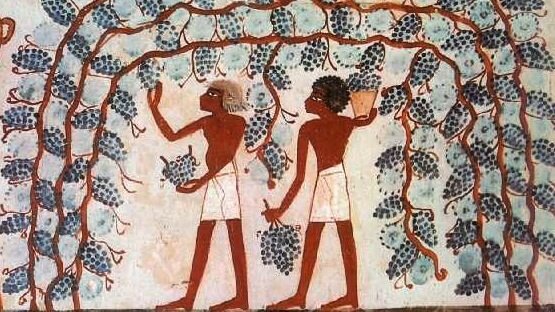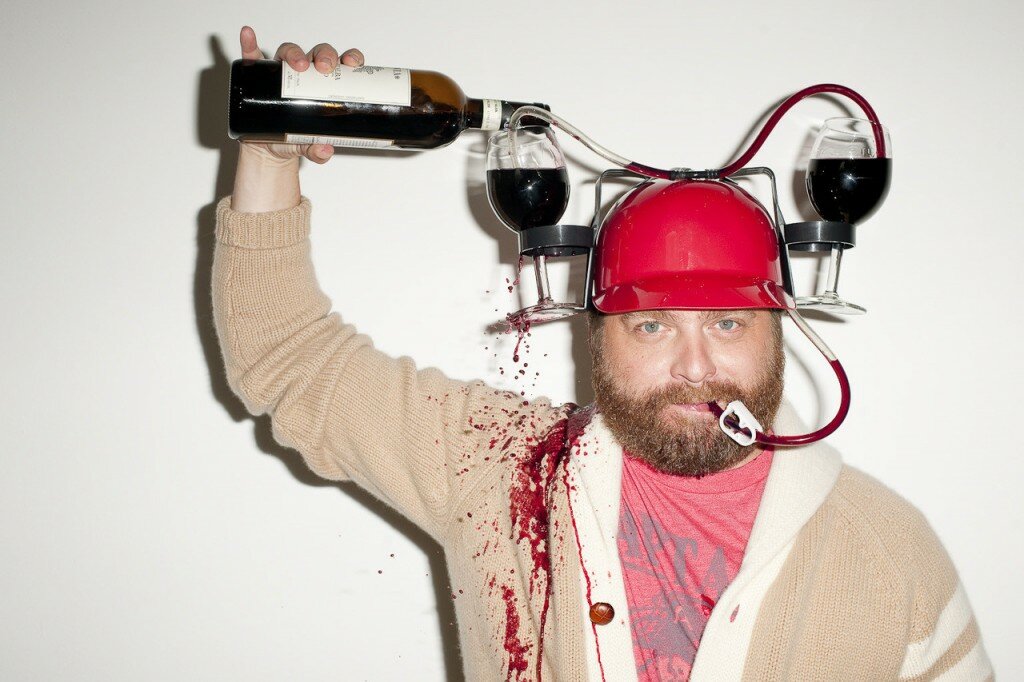It’s safe to say that while a cheering frat guy is holding a bag above your head and lukewarm white wine is running down your chin faster than you can guzzle from the twisty spout, you’re not thinking, “Is this Sauvignon Blanc or Pinot Grigio?”
You’ll wipe your mouth as gracefully as you can and proudly slap the dangling bag with all your might.
While there are many occasions where it’s acceptable to simply be a wine slob (as a matter of fact, for most of college, it’s acceptable to be a slob in general), it’s time to grow up and embrace the notion of being a wine snob as well.
Why?
It’s been around a long ass time.
While you might not feel waves of historic nostalgia as you choose your bottle of Barefoot Moscato in the florescent aisles of Publix, wine is an ancient elixir with a history that spans thousands of years (earliest evidence is in China circa 7000 BCE). The glass of fermented grapes is closely intertwined with the history of agriculture and Western civilization. From the ancient Egyptians to the Roman Empire, wine has been an integral part of a lot of cultures from a lot of different places.

Not to mention the Jews, Catholics and Muslims also dig their vino. That warm, slow “wine drunk” you’re probably familiar with is associated with religious experience and used in ceremonies as a means of getting closer to God. (The Vatican drinks the most wine per capita with 74 liters per capita per year! Pope-in’ bottles).
Amen to that.
Cheap wine is shitty.
Filling your arms with as many bottles of Two Buck Chuck at Trader Joes as you can carry might makes your wallet feel better, but your major organ systems and moral conscious might not feel the same.
Rumors are constantly circulating about its mysterious production methods, none of which have ever really been cleared up by the Franzia brothers (they own Bronco, which owns Two Buck Chuck). It’s been speculated that 1) large tractors grab rotten grapes, leaves, stems and any unlucky insects and rodents that get caught up with the plants and are crushed and fermented all together and/or 2) it’s made like soda in a giant factory with synthetic products and a shit ton of sugar added to mask how gross the grapes are.
And if you’ve ever wondered why your brain feels like the girls bathroom at Cantina on a Friday night (aka really shitty) after a night of wine guzzling, chances are it’s from the crappy bottle you carelessly (or naively) selected.
Besides the additions of flavor concentrates, sugars and “food-safe” chemicals, cheap wine is often “aged” in cheap oak barrels that are charred and coated with chemicals to speed up the whole absorption process. Also, histamines are formed in wine during fermentation (the process in which zee grape juice becomes zee wine) and cheaper wines can have a higher histamine levels. Essentially, you can avoid the miserable sinus headache the next day if you spend a little more.
I don’t know about you, but it seems pretty counterproductive to spend the extra money on organic Chobani yogurt and then “save” on a bottle of grape scented poison.

It’s time to know stuff.
When you were 10 you were probably a connoisseur on all things Pokemon and when you were 16 you were most likely an expert sneaking out of your parents house, but now you’re older and need some grown-up interests as well.
Since you already love getting intoxicated, why not go ahead and learn as much as you can about a specific kind of alcohol? Yes, you can learn about whiskey and scotch and make moonshine in your closet, but chances are, you won’t be ordering a bottle of any of the above on a dinner date.
Here’s where wine comes to the rescue.
It is the perfect beverage to get educated on. It’s acceptable to drink on virtually any occasion (no really, try and think of a time it’s not okay to drink except Cinco De Mayo), you’ll find it in all different varieties all over the world, there is so damn much to learn about it that you’ll never run out of material and, perhaps most importantly (and superficially), people will think you’re a classy, worldly son of a bitch.

While I, myself, am no sommelier, here’s a few facts to get you started:
1. Red wines contain many antioxidants such as polyphenol and resveratrol that have cardio-protective effects and anti-cancer properties.
2. Wine testers swirl their glass to encourage the wine to release all of its powerful aromas (not just to be pretentious).
3. Most European wines are named after their geographical origin, like the Bordeaux wine, which is produced in the Bordeaux region of France.
4. California, New York, and Florida lead the United States in wine consumption.
5. When tasting wine, hold a sip in your mouth for a moment or two before swallowing. A really good wine will have a long aftertaste.
6. Hold your wine glasses by the stem and not by the round glass part because the heat of your hand will raise the temperature of the wine.

If you’re not fully ready to abandon your slutty Yellowtail days, that’s okay. Take things one step at a time and just up your price a few dollars and try something new on the shelf each time. You might be surprised at how quickly your inner wine connoisseur comes alive.
I’ll leave you with some wise words from Rumi, a 13th-centuy Persian poet, jurist, theologian and mystic, whose importance is considered to transcend national and ethnic borders.





